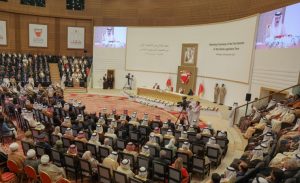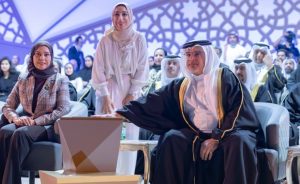Manama : The Kingdom of Bahrain is adorned by red and white, the colours of its flag, every year on December 16 and 17 to celebrate its National Day. The occasion comes in commemoration of the establishment of the modern Bahraini State as an Arab and Muslim state founded by Ahmed Al Fateh in 1783, and the anniversary of His Majesty the King’s Accession to the Throne.
The national festivities represent a component of the Bahraini identity, celebrated by its citizens and residents.
His Majesty King Hamad bin Isa Al Khalifa’s vision for development and democracy created a solid platform for advancement since the National Action Charter (NAC) in 2001. The enhanced political, social, and economic momentum generated more prosperity, freedoms, coexistence and empowerment of women and youth.
The nation continues to build on its momentous progress in many areas over the decades, to which the people of this land have contributed with the spirit of #TeamBahrain. Elaborate strategies were put in place to ensure the sustainability of those outcomes.
This year, the parliamentary elections saw the biggest turnout in the history of the elections at 73.1%. Women participation rose to 48% voters, candidates and winners in the parliamentary and municipal elections. Youth participation reached 45%.
Tens of agreements, executive programmes and memoranda of understanding were signed between the Kingdom of Bahrain and a number of countries and organisations, as a result of its active foreign policy engagement.
Bahrain’s foreign policy approach not only focuses on mutual interests but also seeks to maintain global and regional security and stability. Within the framework of international cooperation, the kingdom also contributes to the international efforts to secure the flow of the food supply chain and the collective efforts to mitigate climate change and achieving zero carbon emissions.
In line with the Bahrain Economic Vision 2030, the government led by His Royal Highness Prince Salman bin Hamad Al Khalifa, Crown Prince and Prime Minister built a dynamic partnership with the private sector aimed at reaching further sustainable development milestones. As a result, progress has been made in trade and economic growth, finance and insurance sectors, real estate, tourism and industry. Bahrain also succeeded in non-oil revenue diversification and creating sustainable strategies to serve economic growth, education, protection of the environment and urban development.
Bahrain’s policies for fiscal balance, revenue diversification, economic recovery and maintaining sovereign debt at safe levels; resulted in a surplus of BD33m in its budget during the first half of 2022, for the first time since 2008.
The kingdom continues to invest in economic development as a tool to drive overall national development. The national economy grew by 6.9% in the second quarter of 2022, the highest since 2011 according to the report issued by the Ministry of Finance and National Economy. The Information and eGovernment authority also announced that foreign direct investment (FDI) grew by 5.6%, with a flow of BD669 million.
The finance sector in Bahrain benefited from this dynamism, as government policies led to a significant improvement in the kingdom’s credit ratings by most rating agencies. Standard & Poors changed Bahrain’s rating from stable to positive in its latest report issued last month in November.
The government used information and communication technology (ICT) as an essential tool to deliver smart solutions for more efficient government services in all sectors. The focus on ICT, combined with the usage of green energy, created education and training opportunities for youth and consequently job opportunities of added value.
The tourism sector also saw a big boom this year. The cabinet announced that tourism revenue in Q3 of 2022 reached a record BD1.2m, with an increase of 110%. This exceeded the target set by the national tourism strategy for the period 2022-2026.
In terms of competitiveness, Bahrain ranked first in the Arab World and MENA region in the Economic Freedom of the World 2022 index released by Fraser Institute. It also made improvement in the indices of government performance, financial market stability, attracting investments, coexistence, telecom infrastructure and cybersecurity. All those factors contribute to a higher investor confidence and a more durable economy.
On a human rights front, Bahrain issued its National Human Rights Plan 2022-2026. The plan was prepared by the Ministry of Foreign Affairs in cooperation with the Higher Coordination Committee for Human Rights. It covers four focus points: civil and political rights; economic, social and cultural rights, the rights of groups with priority care needs; and solidarity rights. The plan incorporates 17 main objectives, 34 sub-objectives and 102 projects, each designed to achieve the desired objectives, particularly in the areas of legislation, institutional development, capacity building, raising awareness, and engagement in achieving the plan’s objectives.
Bahrain’s implementation of alternative sentencing and open prisons is also aligned with the progress it seeks to achieve in human rights.
The historic visit of His Holiness Pope Francis to Bahrain last November, at the invitation of HM the King, was a moment that highlighted Bahrain’s firm belief in the principles of coexistence and diversity. His Holiness participated in the “Bahrain Forum for Dialogue: East and West for Human Coexistence,” with His Eminence the Sheikh of Al Azhar and Chairman of the Muslim Council of Elders, Dr. Ahmed AlTayeb.
During the visit of His Holiness and the forum, the kingdom announced the King Hamad Global Award for Dialogue and Peaceful Coexistence. It comes as a continuum of Bahrain’s efforts in this regard and the principles included in the Kingdom of Bahrain Declaration, launched in Los Angeles in 2017.




